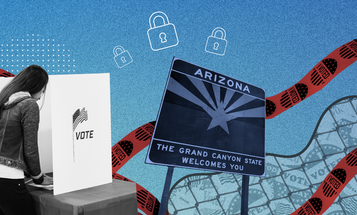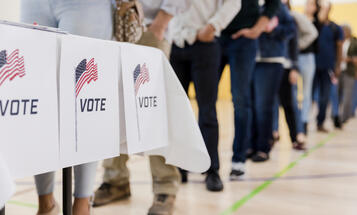
Voters Broke Through Unprecedented Barriers on Election Day, New Analysis by Expert Tova Wang
NEW YORK - After two years of historic attacks on the freedom to vote and despite blatant efforts to suppress the vote through unnecessary obstacles and intimidation, Americans made their voices heard on Election Day, according to a new analysis by voting rights expert and Demos Senior Democracy Fellow Tova Wang. “Lessons Learned from the 2012 Election: How Voters Stood Up Against Suppression, ID Laws, and Intimidation” details the impact of the most flagrant barriers to the ballot enacted in recent months and how, in many states, determined voters and voting right advocates overcame those barriers.
“The right to vote is just that – a fundamental freedom at the cornerstone of American democracy,” writes Wang in the brief published by the national, nonpartisan organization Demos. “In the 2012 election, that sacred value was challenged in a way we have not seen in a couple of generations, perhaps since the civil and voting rights movements of the 1960s… The measures taken were so blatant and widespread that they served to energize coalitions of citizens to fight for voting rights harder than ever, and made many voters more determined to vote and have their vote count.”
Wang’s detailed analysis, which includes a pro-voter reform agenda, surveys the best and worst news from Election Day, including the complicated impact of voter ID laws across the country. Despite wins for voting rights advocates in several states where laws were struck down or enjoined for this election, four states had strict photo ID laws in force on November 6th—Kansas, Georgia, Indiana, and Tennessee. Advocates fighting the Tennessee law estimate that 390,000 registered voters in that state do not have the picture ID now required to vote in that state. Yet the state has only “issued 20,923 state IDs for voting purposes.” And in Pennsylvania, the late halting of the voter ID requirement allowed for poll worker confusion: All of the polling places in Crawford County, Pennsylvania, posted signs saying that identification was required to vote. Minnesota was a bright spot for voting rights advocates, however, as voters rejected a voter ID ballot measure and protected Same Day Registration.
“Lessons Learned from the 2012 Election” also highlights:
- Provisional Ballots: When voters are not on the rolls, they are often instructed to cast a provisional ballot; however, several states -- such as Florida, Nevada, Iowa, and Virginia -- do not count ballots cast in the wrong precinct, even if it was through no fault of the voter.
- Challenger Groups: Despite much fanfare, groups like True the Vote mostly failed in their attempts to purge the rolls and to organize significant numbers of volunteer challengers at the polls. For example, on Election Day, the Franklin County, Ohio Board of Elections determined that True the Vote may have falsified the forms submitted for election observers, who must be appointed by a group of candidates. But they did cause some trouble: right before the election The Voter Integrity Project in North Carolina challenged thousands of registrations claiming people were dead. In addition to wasting the time of already stressed elections officials who threw many of the challenges out because the data matching the group used was so flawed, hundreds of people in NC had to prove they weren’t dead to the BOE.
- Early Voting: According to reports, the cutbacks in Florida’s early voting hours may have reduced the number of voters who participated in early voting this year by 300,000 votes, and contributed to Florida’s extraordinarily long lines at early voting sites and on Election Day.
- Felon Disenfranchisement: In addition to the nearly 6 million voters shut out by felon disenfranchisement laws, two states -- Florida and Iowa – went further in the last two years. In Florida, for example, there is a mandatory 5-year waiting time before a citizen can even apply to the governor’s clemency board and there is a backlog now of over 100,000 applications awaiting action.
“The 2012 Election cycle contained blatant and widespread measures to suppress the votes of millions of American voters, particularly African American, youth, and Latino voters,” said Wang. “Despite the many barriers to democracy that were thrown in their way, the American people persevered and made their voices heard. Yet there is much work to be done to ensure America becomes a more inclusive and representative democracy.”
“Lessons Learned from the 2012 Elections” outlines a sensible reform agenda that would address many of the problems voters faced on November 6th. These measures include Same Day, portable and permanent registration; expansion of early voting to avoid long lines on Election Day; laws to prevent unfounded challenges and other forms of voter harassment and intimidation; and greater efforts to ensure Americans who are not proficient in English can exercise their right to vote.
To interview Tova Wang, please see contact information above. Wang is a nationally known expert on election reform and political participation in the United States, and author of the recent Century Foundation book The Politics of Voter Suppression: Defending and Expanding Americans’ Right to Vote (Cornell University Press). She is Senior Democracy Fellow at Demos, a Fellow at The Century Foundation, and a consultant to organizations working to improve democracy around the world, such as the National Democratic Institute and The Carter Center.
###



